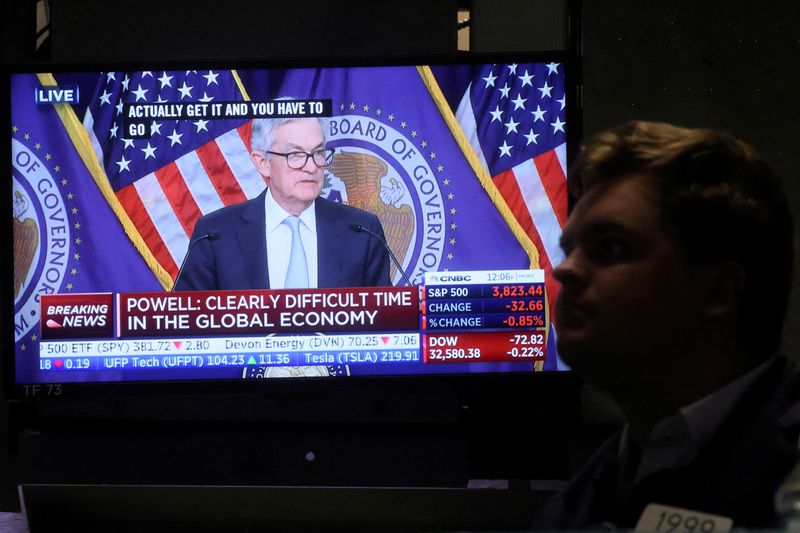By Yoruk Bahceli
(Reuters) - Central banks are starting to slow aggressive rate rises but are far from done even as recession looms, leaving investors alert to risks that prolonged tightening could hurt the economy more than necessary.
Surging inflation has forced developed economies to raise borrowing costs by a combined 25.15 percentage points this cycle, the most aggressive in decades.
So it's no surprise that signs central banks in the United States, euro area and Britain will follow smaller peers and slow the pace have sparked relief. U.S. stocks are up 13% from October's lows; 10-year Treasury yields slid by 0.38 percentage points, or 38 basis points, in November, the most since March 2020.
However, markets still expect the Federal Reserve to raise rates by over 100 basis points (bps) to 5% by the second quarter of next year. The European Central Bank, which has raised rates by 200 bps since July, is expected to nearly double its deposit rate to just under 3% by mid-2023.
With inflation potentially peaking and recession looming, the risk of overtightening accelerating a downturn is on investors' watchlists for next year.
"We're past the point of the big (Fed) policy mistake, we think they kind of made it," Robert Waldner, head of macro research at $1.3 trillion asset manager Invesco, said.
"They were too aggressive. They delivered many rate hikes in a very short period of time."
Recent Fed research suggests the bank has exceeded the level called for by commonly followed policy rules and should target 3.52%, versus the 3.75%-4% it currently targets.
Waldner said he would recommend an even slower tightening pace than markets expect. He believes rates are already restrictive, inflation has peaked and growth is slowing.
Oil prices, down 45% since February, have erased 2022 gains. European natural gas prices are still elevated, but down some 60% from a September peak.
Supply chain disruptions have eased and producer prices are moderating or falling. ABN AMRO (AS:ABNd)'s index measuring global bottlenecks returned to neutral level in November for the first time since late 2020.
Latest U.S. and euro zone inflation prints eased more than expected.
Yes, economic growth figures have generally held up better than expected.
Still, Britain's economy shrank in the quarter to September, putting it on the brink of a potentially lengthy recession, U.S. manufacturing is contracting and business activity data points to a mild euro area recession. A Reuters poll sees a 60% chance of a U.S. recession over the next year, up from 25% in June.
Graphic: Global economic activity flashes red, https://www.reuters.com/graphics/GLOBAL-ECONOMY/byprllommpe/chart.png TIME LAGS
Pictet Wealth Management senior U.S. economist Thomas Costerg worries about the gap between forward-looking indicators pointing to economic slowdown and the strength in labour markets that the Fed is keen to weaken.
U.S. mortgage rates have doubled this year, applications are down some 40%. Home sales are falling much faster than in previous tightening cycles, according to alternative asset manager Apollo.
Fed research, taking into account the premium on mortgages and corporate borrowing costs, has found financial conditions in September already reflected the equivalent of a 5.25% policy rate.
"The Fed is still fixated on backward-looking data. I am worried the Fed may not be taking into account the lags in their monetary policy," Costerg said.
OECD research has also shown that all advanced economies raising rates at the same time hits growth harder with less of an impact on reducing inflation.
"The Fed is seriously underestimating what happens to the U.S. economy if the global economy goes into a recession," said Claudia Sahm, a former Fed economist.
HOW HARD?
In the euro zone, surging energy prices and supply constraints have largely driven inflation and some see the ECB pushing too hard as its hikes do little to tame those pressures.
Hawkish policymakers stress the need to prevent a wage-price spiral, but admit there is no sign of one emerging with wage settlements around 4% this year against 10% inflation.
Graphic: Will the ECB slow down? https://www.reuters.com/graphics/EUROZONE-MARKETS/ECB/mopaknxbjpa/chart.png The ECB has also said the anticipated recession would likely be insufficient to tame inflation.
Former ECB chief economist Peter Praet told Reuters such thinking opened the door to a harder landing without clarity on how big a recession the ECB thinks is necessary to tame inflation.
"What they've done so far is basically okay, but the risk of a mistake has not disappeared," he said.
Both U.S. and German short-dated bonds are yielding much more than long-dated ones, a sign markets suspect monetary policy will exacerbate economic pain. The additional yield on the U.S. two-year bond relative to the 10-year was recently the highest since the early 1980s.
UniCredit chief economic adviser Erik Nielsen said the ECB should pause.
"My real concern is 2023-24, when this year's monetary policy tightening will have maximum impact on demand and work as an amplifier of the pain on households and businesses of higher energy prices ... just as most of the fiscal support may then need to be rolled back," he said in a note. Graphic: US yield curve deeply inverted, https://fingfx.thomsonreuters.com/gfx/mkt/mopakknxwpa/YCDEC.PNG
